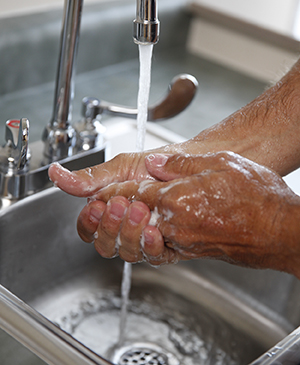Certain infections can spread from person to person. This is why your loved one may be put in a special room while in the hospital. Restrictions may be placed on who can go in and out of that room and what protection must be worn. Read this sheet to better understand why this is done.
Practice good hand hygiene to help stop the spread of germs.
How infection spreads
Infection is caused by germs. An infected person carries germs that they can give to others. Even a person who doesn’t feel sick can still carry and spread germs. Germs can cause infection by traveling through the air or through direct contact. Or, they can spread when people touch the same surface in a room. This includes a doorknob, sink faucet, table, or chair.
How you can get infected
To infect you, germs first have to get onto or inside your body. You can get infected by touching a contaminated person or object. You can also get infected by breathing contaminated air. This is why good hand hygiene and other infection control advice, such as wearing a mask or a hospital gown, are so important. Hand hygiene means handwashing with soap and clean, running water. Or, you can use alcohol-based gels or foams that don't need water.
Preventing infection
To stop infection from spreading, health care workers may do one or more of the following:
-
Put an infected person in a private room. This room may have special airflow or an air cleaning system in place to prevent germs from traveling out to the hallway. Or they may put a person in a room with others who have the same infection. (This depends on what kind of infection the person has.)
-
Wear a mask, gloves, gown, or other items.
-
Wear an air filter (respirator) for some infections.
-
Wash hands with soap and clean, running water for at least 20 seconds or use an alcohol-based hand sanitizer that contains at least 60% alcohol before going into or leaving a person's room.
What you can do
Here’s how to help stop the spread of infection:
-
You may be asked to wear a mask, gloves, or gown when you visit. Follow any directions carefully. Clean your hands with soap and water for at least 20 seconds or use an alcohol-based sanitizer that contains at least 60% alcohol before and after touching the person.
-
Practice good hand hygiene. This is especially important after using the bathroom. And before and after touching the person or the person's surroundings.
-
Keep your hands away from your face.
-
Cough or sneeze only into a tissue or into your bent elbow. Wash your hands with soap and water for 15 to 30 seconds after you blow your nose, cough, or sneeze.
-
Don't use the person’s bathroom.
-
Don't visit someone in the hospital if you feel sick. Don't visit if you have been exposed to an illness such as the flu, COVID-19, chickenpox, or measles.


